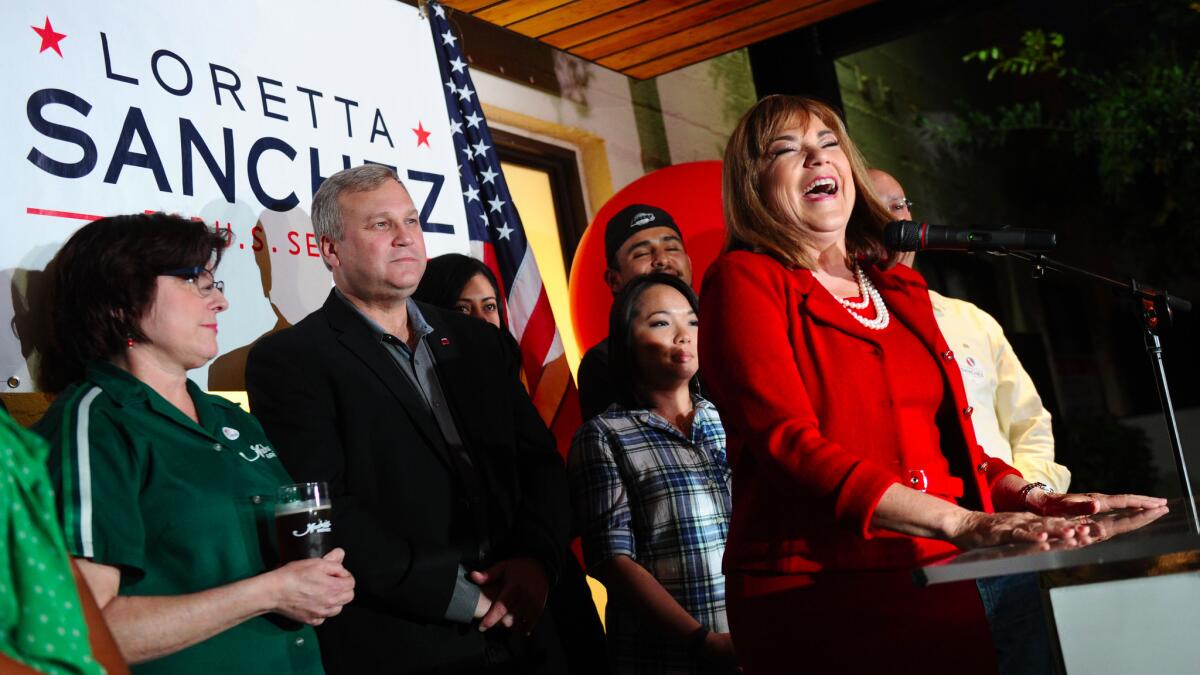For a comeback in her Senate race, Democrat Loretta Sanchez may need the help of Republicans

Reporting from San Francisco — Democratic Orange County Rep. Loretta Sanchez survived Tuesday’s U.S. Senate primary election, but finished so far behind front-runner Kamala Harris that her chances of a surprise victory in November may depend on a disparate patchwork of California voters, including a bevy of Republicans.
Almost on cue the day after the election, a Sacramento-based GOP political consultant announced plans for a super PAC-funded “Sanchez for California Project” to increase her support among California Republicans. But even a million-dollar campaign to lure them in, if it ever materializes, may not be nearly enough in a state where Democrats hold a 3.14-million-person edge in voter registration.
Out of a field of 34 Senate candidates, Harris won 40.4% of the vote Tuesday compared with Sanchez’s 18.6%. The Democratic state attorney general bested Sanchez in all but five of California’s 58 counties and almost beat the congresswoman in her home county, according to preliminary election returns.
See where they won: full results from the California primary >>
“I think that Harris’ performance was dominant,” said Democratic political consultant Katie Merrill. “Sanchez has a lot of work ahead of her. But to the Harris folks, I would say never say never. It’s a very different electorate in the general election than in the primary election.”
California also has never seen a statewide general election between two Democrats. In congressional and legislative races, when two Democrats or two Republicans have faced off in a general elections, the gap between the candidates has tended to tighten up after the primary, Merrill said.
She added that Latino voters may turn out en masse in November to oppose presumptive Republican presidential nominee Donald Trump and his fiery anti-immigrant rhetoric. That would appear to help Sanchez, since Latinos are her biggest base of support.
Harris on Wednesday dismissed any notion of vulnerability among Latinos or other voters, saying evidence of her widespread political strength was easy to see in Tuesday’s election returns.
“People of every demographic, every geographic location in our state all came together. It was not North versus South; it was not the coast versus inland. All Californians spoke. And we unified them,” Harris told reporters after hobnobbing with diners at Oakland’s Home of Chicken and Waffles. “That that’s how we’re going to go into November.”
Election 2016 | California politics news feed | Sign up for the newsletter
Harris trounced Sanchez in Los Angeles County and in the Bay Area, where she served as San Francisco’s district attorney before being elected as attorney general in 2010. Along with her own county, Sanchez topped Harris in Fresno, Madera, Kings and Imperial counties.
Harris has been endorsed by the California Democratic Party and Gov. Jerry Brown, and her widespread support among Democrats in the state was obvious and devastating to Sanchez, said Harris political consultant Sean Clegg.
“She has a crater in the Democratic base,” Clegg said of the congresswoman.
The Sanchez campaign acknowledged there were “significant challenges ahead” but said Harris would be mistaken if she expects the campaign to be a cakewalk. Sanchez’s campaign consultant, Bill Carrick, said approximately 6 million Californians voted on Tuesday. In the 2012 November election, more than 12 million people cast ballots.
“You know who people are going to be chasing? The group of people who didn’t vote yesterday,” Carrick said Wednesday. “The electorate in the general election is more Latino, more Asian, and it will tilt toward Southern California.”
Carrick said the Sanchez campaign is trying to build a coalition that will “cross party lines, cross regional lines -- every kind of line you can imagine.” But he brushed aside speculation that the Democratic congresswoman’s viability in November rests solely in winning over Republicans.
Republican consultant Mike Madrid said that along with the need for a strong Latino voter turnout, Sanchez must capture significant Republican support to have any sort of chance. It can be done, he said, because Sanchez’s expertise on national defense issues, reputation as a fiscal moderate and openness to at least considering new reservoirs in California will appeal to GOP voters.
Not to mention that the choice for Republicans is limited with no GOP Senate candidate on the November ballot. Republican voters’ only options will be to cast a ballot for Harris or Sanchez, or not to vote, he noted.
“Campaigns are about contrast. All she has to prove is that Kamala is more of a hippy-dippy liberal than she is,” Madrid said. “It’s not hard to prove.”
Times staff writer Nina Agrawal in Los Angeles contributed to this report.
Twitter: @philwillon
ALSO:
Unusual outcomes new normal in California’s top-two primary
These California mega-donors haven’t given a penny in the U.S. Senate race
Sanchez no-show at UFW convention is missed opportunity for California’s U.S. Senate race
California’s next senator could be a Latina. Will her past mistakes get in the way?
Kamala Harris is focus of California’s final U.S. Senate debate before primary
Updates on California politics
More to Read
Get the L.A. Times Politics newsletter
Deeply reported insights into legislation, politics and policy from Sacramento, Washington and beyond. In your inbox three times per week.
You may occasionally receive promotional content from the Los Angeles Times.











